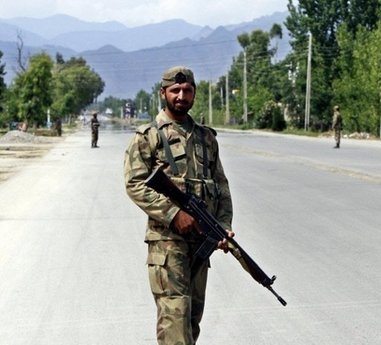Pakistan holds rare cross-party talks on Thursday designed to build unity in the face of mounting American pressure to act against the Al-Qaeda-linked Haqqani network or face the consequences.
The talks come after Secretary of State Hillary Clinton said Wednesday that the US was conducting a final review on whether to blacklist the network, which it blames for deadly attacks in Afghanistan, as a terror group.
The outgoing top US military officer, Admiral Mike Mullen, has accused Pakistan of exporting violent extremism to Afghanistan and called the Haqqani network a “veritable arm” of Pakistan’s Inter-Services Intelligence agency.
And given the US claims about Pakistan government ties to the network, analysts have warned there is a risk Islamabad will be branded a state sponsor of terror.
The White House on Wednesday appeared to be treading more carefully on the issue, with spokesman Jay Carney saying he would not have used the same language as Mullen, and Clinton saying the countries have to “work together”.
She also said the US has already designated the key leaders of the network as terrorists, with seven members placed under US sanctions since 2008.
Unease has been growing in Pakistan over the US demands to act against the Haqqanis but Prime Minister Yousuf Raza Gilani is expected to use the conference to try to rally support behind the government and military rather than formulate new strategies.
American officials want Pakistan to launch an offensive against the Haqqanis, but the military says it is too over-stretched fighting local Taliban to open a new front against a US enemy that does not padopt a “joint stand on national security”.
Members of Gilani’s fragile coalition, the opposition and the main religious parties are expected to attend the Thursday afternoon talks. Civilian politicians will likely fall into line behind the military, considered the chief arbiter of power in Pakistan.
Gilani’s office said the conference would Top party leaders, including opposition leader Nawaz Sharif and heose a threat to Pakistan. ads of Islamic parties such as pro-Taliban cleric Fazlur Rehman have signalled that they will be there.
“All the political parties will plan a road map for the future and government will ensure implementation of this strategy,” said Information Minister Firdous Ashiq Awan.
Although nothing suggests the United States is considering a unilateral ground action, Pakistanis are increasingly fearful of another American raid similar to the operation that killed Osama bin Laden on May 2.
The covert raid humiliated the army, embarrassed the government and brought relations between Pakistan and the United States to their lowest point.
More probable American action would be increased drone strikes targeting Islamist militants in Pakistan’s semi-autonomous border areas with Afghanistan, or a cut in financial aid to the cash-strapped country of 167 million.
Gilani’s main ruling Pakistan People’s Party (PPP), which leads a precarious majority in parliament, faces strong domestic criticism for supporting the United States in its war on terror and providing logistical support.
Retired general turned political analyst Talat Masood told AFP that the government and the military want to defuse the latest crisis.
“The gathering is intended to send a strong signal from the country’s political parties that they stand united behind the military in the wake of US pressures,” he said.
“The government wants to release pressure… although everybody knows that it is the military that will decide what type of relationship it wants with the United States.
“The conference will serve as political catharsis to let passions cool off.”
US allegations of Pakistan waging a proxy war in Afghanistan triggered a frenzy of anger this week with several thousand people attending rallies.
Qazi Hussain Ahmed, a senior leader in the religious Jamaat-e-Islami party told a gathering on the Afghan border that Pakistan should quit the alliance.
PPP protesters outside the US consulate in Karachi condemned the US threats and set fire to American flags.










